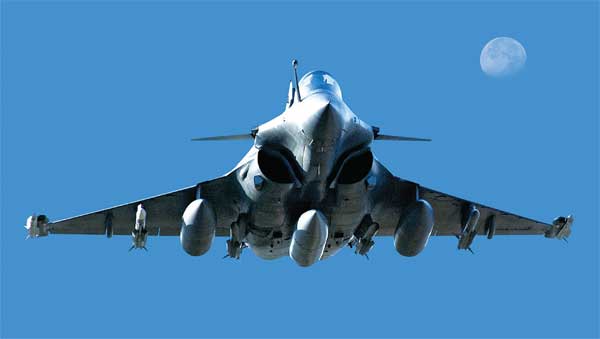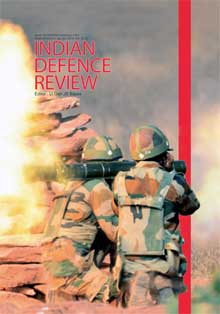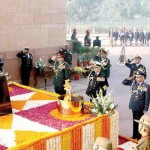According to most commentators, the visit to India of French President Emmanuel Macron has been an unqualified success. For the first time, a French President was on the cover a national magazine; another first, President Macron gave an interview from the Elysee Palace in Paris which was broadcasted in prime time on a major TV channel … and the President spoke in English. Hard to believe? This undoubtedly symbolises the changing, though always-special relations between France and India, celebrating twenty years of ‘strategic partnership’. But what is a successful visit?
France has constantly been supportive of India, particularly for a permanent seat in the UN Security Council, and has shown comprehension for India’s nuclear policy…
According to most commentators, the visit to India of French President Emmanuel Macron has been an unqualified success. For the first time, a French President was on the cover a national magazine; another first, President Macron gave an interview from the Elysee Palace in Paris which was broadcasted in prime time on a major TV channel … and the President spoke in English. Hard to believe? This undoubtedly symbolises the changing, though always-special relations between France and India, celebrating twenty years of ‘strategic partnership’. But what is a successful visit?
Jokingly, it is said that a surgeon announces that an operation has been successful when the patient is taken alive from the OT; at that time, the post-op complications cannot yet be guessed. In the case of a State visit, it is usually judged by the number of MoUs, Letters of Intent and Framework Agreements signed during the visit. In fact, this means little, because it is only during the following months and years that the real success of a visit can be seen. The Strategic Partnership signed in 1998 by President Jacques Chirac and Prime Minister AB Vajpayee, was a success, simply because it has stood the test of time and is still there as a basis of all future relationship between France and India.
The first ‘strategic partnership’ signed by India was during President Chirac’s visit to India, “Both countries share a perspective that the new world order has to be genuinely multi-polar. Our bilateral relationship is poised to grow in the coming months in a multi-faceted manner,” had been declared by the French President at that time.
Over the last two decades, the partnership has steadily grown; no major political difference has darkened the sky between Paris and Delhi. France has constantly been supportive of India, particularly for a permanent seat in the UN Security Council and has shown comprehension for India’s nuclear policy. Though in recent years, the term ‘strategic partnership’ has been devalued by the multiplication of such accords, in the Indo-French case, the 1998 momentum has been sustained by new initiatives.
What is less known is that, despite the differences, India and France continued to work together…
Sensitive Areas
In October 2017, as she arrived in India to prepare for President Macron’s visit (then scheduled in December), the French Minister of Armed Forces, Florence Parly, stated in an interview to The Times of India that India was France’s ‘major strategic partner in Asia’. She noted that the relationship was, “the fruit of a long, shared history, grounded in an unshakable trust. We have always worked alongside India, in good times, but also at difficult moments,” adding “our partnership is continuing to develop even more, including in very sensitive areas.” These ‘sensitive’ areas make the difference.
Easy Relations
Between 1947 and 1954, the relations were often tense due to the issue of the French settlements in India which would only be solved with the de facto transfer of Pondicherry to the Union of India at the end of 1954. What is less known is that, despite the differences, India and France continued to work together. On October 26, 1953, a secret cable addressed to Prime Minister Jawahar Lal Nehru sent by HS Malik, the Indian Ambassador in Paris demonstrates this. Ambassador Malik wrote, “All of us in the Embassy who have been working on the implantation of the contract with the Defence Ministry here for the supply of Ouragan [Toofani in India] aircraft, were greatly relieved and delighted when we got the news that our four pilots with the four Ouragans had reached Palam safely.” Ambassador Malik informed the Indian Prime Minister of the wonderful cooperation received “from the officers of the French Ministry of Defence, from the Cabinet Minister downwards and from the French industry.”
Let us remember that this was perhaps one of the most trying periods on the ground, particularly in Pondicherry. A contract had however been signed with Dassault in June 1953 for 70 planes; as Ambassador Malik noted, four planes had already been flown to India while another 35 had been sent with the Dixmude aircraft carrier. The remainder 32 aircraft would be delivered in early 1954. Ambassador Malik told the Prime Minister, “I have been thinking for some time whether it would be possible to use the opportunity provided us by this cooperation and collaboration by the French to relive somewhat the existing unfortunate state of relations between India and France on account of the position which we naturally have had to take up vis-à-vis the stupidity and lack of imagination of the French over the question of the French Settlements in India.” The issue of the French settlement was eventually solved in October 1954. Now, with the changing times, the relation has become much deeper too.
Some 14 bilateral agreements were signed at Hyderabad House, strengthening the bilateral economic, political and strategic ties between the two countries…
The Present Visit
On his arrival, the French President stated that the visit would open a new era in strategic partnership for the coming decades, “Our two democracies have common channels like terrorism, lots of common risks and common threats. But we have to protect this history and the state for freedom.” President Macron also affirmed, “I want my country to be the best partner in Europe. This is a strong message. I want Indian citizens coming to France for studying, becoming entrepreneurs and opening start-ups.” Addressing the French Community in Delhi, the young President explained, “…geo-political context is deeply changed. India rightly fears the reorganisation of the world; she fears forms of hegemony in the region and in particular in the Indian Ocean and the Pacific. And why not name it, she fears a Chinese hegemony.”
He reminded his countrymen, “France is a power of the Indian and the Pacific Oceans; we are present at the Reunion, we are also there in French Polynesia and New Caledonia. And we are a maritime power, it is often forgotten, but France is the second maritime power in the world. We have a strong navy, we have nuclear submarines equipped like few other powers in the world; a maritime surveillance capability through our own satellites and technologies; it is obvious we are a military and intelligence power ranking us among the first nations in the world.” This power, France is now ready to share with India.
Before concluding, Macron quoted the Australian Prime Minister, who spoke of ‘freedom of sovereignty’. He then added, “This renewed strategic partnership is reflected by the confirmation of a defence link that has already materialised in some very important contracts, be it in the naval or aviation domain.” President Macron also spoke of “a coming generation of a new partnership on development of engines [the Kaveri for the Tejas], but also enhanced cooperation in terms of spatial surveillance or in terms of intelligence.” We shall come back to it.
Prime Minister Modi agreed to participate in the closing of the First World War Centenary celebrations, which will take place on November 11 in Paris this year…
Bilateral Agreements
Though some 14 bilateral agreements were signed at Hyderabad House, strengthening the bilateral economic, political and strategic ties between the two countries, only one of these agreements dealt with defence. It is about ‘Provision of reciprocal logistics support between their Armed Forces.’ Signed by the Minister of Defence Nirmala Sitharaman and Minister Florence Parly, it says, “This Agreement shall facilitate the reciprocal provision of Logistic Support, Supplies and Services between the Armed Forces of the two countries during authorised port visits, joint exercises, joint training, humanitarian assistance and disaster relief efforts.” The importance of this is to develop trust between the two defence forces.
The Joint Statement
Issued after the bilateral talks, the Joint Statement affirmed, “Both leaders agreed to deepen and strengthen the bilateral ties based on shared principles and values of democracy, freedom, rule of law and respect for human rights.” Perhaps a message to China! On the emotive side, “the valiant sacrifices made by Indian and French soldiers during the First World War” was mentioned. Prime Minister Modi agreed to participate in the closing of the First World War Centenary celebrations, which will take place on November 11 in Paris this year. One of the first articles deals with the deepening interaction in the maritime domain and the enhancement of cooperation in the Indian Ocean Region. It welcomed the “Joint Strategic Vision of India-France Cooperation in the Indian Ocean Region”, as a guiding beacon for such partnership. The leaders agreed also on the importance of the regular joint military exercises, “Both sides looked forward to the next Varuna Naval exercise in India in the coming weeks and to the next Garuda Air Force exercise in France in 2019.” In fact, both countries are keen to enhance the level of exercises.
Coming to the Rafale deal, the Joint Statement says Prime Minister Modi and President Macron “noted with satisfaction the on-schedule progress in the implementation of acquisition related agreements. They also noted the commissioning of INS Kalvari, the first Scorpene submarine made in India by Mazagon Dock Shipbuilders Ltd., in collaboration with Naval Group, the French shipbuilder.” About the crucial offsets clauses which will be the barometer for a success or failure of the partnership, the leaders agreed “to continue their discussions to expand and deepen the ongoing defence manufacturing partnerships.” The ‘Make in India’ scheme was discussed. It was thought that this could offer “a valuable opportunity for Indian and French defence enterprises to enter into arrangements for co-development and co-production of defence equipment in India, including through transfer of know-how and technologies to the mutual benefit of all parties.”






